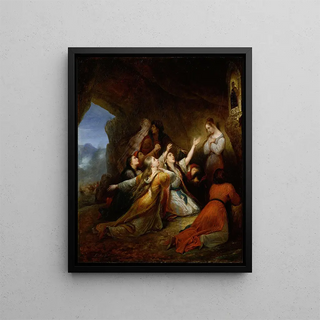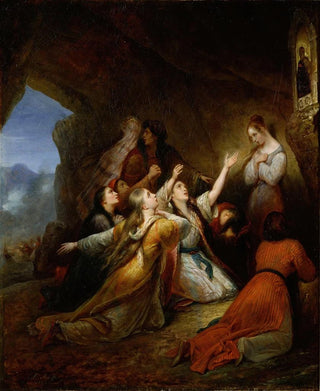Art print | Greek women imploring the Virgin to help them - Ary Scheffer


View from behind

Frame (optional)
"Femmes grecques implorant la Vierge de les aider" by Ary Scheffer is an iconic piece of Romanticism that transcends the simple pictorial frame to embody an emotional and spiritual dimension. Contemplating this artwork, the viewer is immediately transported into a world where human suffering and the quest for redemption intersect. This poignant depiction of distressed women, pleading for the Virgin's help, evokes universal themes of faith, despair, and hope. Ary Scheffer, with his mastery of nuances and expressions, succeeds in capturing the very essence of the human soul, making this piece a true masterpiece.
Style and uniqueness of the artwork
Scheffer's style is characterized by delicacy in the treatment of figures and a subtle use of light, which gives his characters an almost ethereal dimension. In "Women Greek imploring the Virgin to help them," the facial features are imbued with great expressiveness, revealing intense emotions that touch the viewer's heart. The drapery of the clothing, carefully rendered, adds visual depth to the scene, while the chosen colors oscillate between soft tones and darker shades, illustrating the contrast between suffering and divine serenity. The composition, centered around the Virgin, creates a focal point that draws the eye, inviting meditative contemplation. Every detail, from the desperate gesture to the tilt of the head, is designed to evoke a strong emotional response, making this art print unique in its approach to spirituality.
The artist and his influence
Ary Scheffer, born in 1795 in the Netherlands, is a prominent figure of the Romantic movement in France. His career is marked by encounters with influential artists and thinkers of his time, which profoundly influenced his work. His art, often inspired by literary and historical themes, bears witness to a keen sensitivity to human suffering and spiritual struggles. Scheffer established himself as a master in the art of emotional representation.

Matte finish

View from behind

Frame (optional)
"Femmes grecques implorant la Vierge de les aider" by Ary Scheffer is an iconic piece of Romanticism that transcends the simple pictorial frame to embody an emotional and spiritual dimension. Contemplating this artwork, the viewer is immediately transported into a world where human suffering and the quest for redemption intersect. This poignant depiction of distressed women, pleading for the Virgin's help, evokes universal themes of faith, despair, and hope. Ary Scheffer, with his mastery of nuances and expressions, succeeds in capturing the very essence of the human soul, making this piece a true masterpiece.
Style and uniqueness of the artwork
Scheffer's style is characterized by delicacy in the treatment of figures and a subtle use of light, which gives his characters an almost ethereal dimension. In "Women Greek imploring the Virgin to help them," the facial features are imbued with great expressiveness, revealing intense emotions that touch the viewer's heart. The drapery of the clothing, carefully rendered, adds visual depth to the scene, while the chosen colors oscillate between soft tones and darker shades, illustrating the contrast between suffering and divine serenity. The composition, centered around the Virgin, creates a focal point that draws the eye, inviting meditative contemplation. Every detail, from the desperate gesture to the tilt of the head, is designed to evoke a strong emotional response, making this art print unique in its approach to spirituality.
The artist and his influence
Ary Scheffer, born in 1795 in the Netherlands, is a prominent figure of the Romantic movement in France. His career is marked by encounters with influential artists and thinkers of his time, which profoundly influenced his work. His art, often inspired by literary and historical themes, bears witness to a keen sensitivity to human suffering and spiritual struggles. Scheffer established himself as a master in the art of emotional representation.






